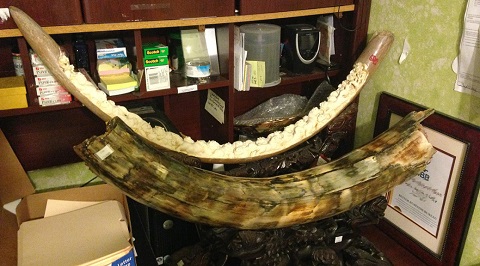
Report Date:
http://www.dfg.ca.gov/Investigations by the California Department of Fish and Wildlife (CDFW) have culminated in illegal trafficking of wildlife cases pending in Los Angeles and Alameda counties, and in San Francisco.
In recent weeks, CDFW’s Wildlife Trafficking Team worked three separate investigations:
CDFW wildlife officers have submitted formal complaints to prosecutors in San Francisco and Los Angeles and Alameda counties. Prosecutors will determine whether charges will be filed. No arrests have been made to date.
A law banning the sale of nearly all ivory in the state of California took effect July 1, 2016. The ban, which can be found in California Fish and Game Code, section 2022, encompasses teeth and tusks of elephant, hippopotamus, mammoth, mastodon, walrus, warthog, whale and narwhal, as well as rhinoceros horn, regardless of whether it is raw, worked or powdered, or from a store or a private collection. Under the law, advertising the sale of any items containing ivory is also strictly prohibited. The legislation helped fund the team of CDFW officers to focus on ivory, rhinoceros horn and other wildlife trafficking, including training and laboratory capability for evidence analysis.
“Under Governor Brown’s leadership, laws to combat illegal wildlife trafficking have been substantially strengthened,” said David Bess, Chief of CDFW’s Law Enforcement Division. “The creation of our Wildlife Trafficking Team and enhancement of our laboratory and legal staff are important steps in stopping the epidemic of poaching and trafficking of wildlife in California and around the world. This effort by our wildlife officers demonstrates that the black market trafficking of wildlife in California will not be tolerated. We stand ready beside our federal and state partners, as well as District Attorneys across the state to take these poachers and traffickers out of business.”
Under the new law, raw ivory and most crafted items that include ivory may no longer be purchased, sold or possessed with the intent to sell, with limited exceptions, including the following:
Although the sale of ivory and elephant parts has been illegal in California since 1977, the new law closed a loophole that allowed the continued sale of ivory that was imported into the state before 1977. The sale of ivory, rhino horn or products that contain ivory will be a misdemeanor, punishable by fines up to $50,000 and one year of incarceration.
Report Date:
Question: I occasionally spend three days (and two nights) aboard my boat (fully self-contained) on Tomales Bay. Is it legal......
Report Date:
The California Department of Fish and Wildlife (CDFW) is reminding north state Trinity River anglers to return salmon and steelhead......